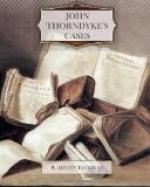The coroner’s subpoena had named ten o’clock as the hour at which Thorndyke was to attend to give evidence, but a consultation with a well-known solicitor so far interfered with his plans that we were a quarter of an hour late in starting from the Temple. My friend was evidently in excellent spirits, though silent and preoccupied, from which I inferred that he was satisfied with the results of his labours; but, as I sat by his side in the hansom, I forbore to question him, not from mere unselfishness, but rather from the desire to hear his evidence for the first time in conjunction with that of the other witnesses.
The room in which the inquest was held formed part of a school adjoining the mortuary. Its vacant bareness was on this occasion enlivened by a long, baize-covered table, at the head of which sat the coroner, while one side was occupied by the jury; and I was glad to observe that the latter consisted, for the most part, of genuine working men, instead of the stolid-faced, truculent “professional jurymen” who so often grace these tribunals.
A row of chairs accommodated the witnesses, a corner of the table was allotted to the accused woman’s solicitor, a smart dapper gentleman in gold pince-nez, a portion of one side to the reporters, and several ranks of benches were occupied by a miscellaneous assembly representing the public.
There were one or two persons present whom I was somewhat surprised to see. There was, for instance, our pock-marked acquaintance of Mansell Street, who greeted us with a stare of hostile surprise; and there was Superintendent Miller of Scotland Yard, in whose manner I seemed to detect some kind of private understanding with Thorndyke. But I had little time to look about me, for when we arrived, the proceedings had already commenced. Mrs. Goldstein, the first witness, was finishing her recital of the circumstances under which the crime was discovered, and, as she retired, weeping hysterically, she was followed by looks of commiseration from the sympathetic jurymen.
The next witness was a young woman named Kate Silver. As she stepped forward to be sworn she flung a glance of hatred and defiance at Miriam Goldstein, who, white-faced and wild of aspect, with her red hair streaming in dishevelled masses on to her shoulders, stood apart in custody of two policemen, staring about her as if in a dream.
“You were intimately acquainted with the deceased, I believe?” said the coroner.
“I was. We worked at the same place for a long time—the Empire Restaurant in Fenchurch Street—and we lived in the same house. She was my most intimate friend.”
“Had she, as far as you know, any friends or relations in England?”
“No. She came to England from Bremen about three years ago. It was then that I made her acquaintance. All her relations were in Germany, but she had many friends here, because she was a very lively, amiable girl.”




